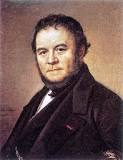The Red and the Black Page #7
Le Rouge et le Noir is a historical psychological novel in two volumes by Stendhal, published in 1830. It chronicles the attempts of a provincial young man to rise socially beyond his modest upbringing through a combination of talent, hard work, deception, and hypocrisy.
Madame de Rênal, who had a very shy, and apparently a very uneven temperament, was particularly shocked by M. Valenod's lack of repose, and by his boisterous loudness. Her aloofness from what, in the Verrières' jargon, was called "having a good time," had earned her the reputation of being very proud of her birth. In fact, she never thought about it, but she had been extremely glad to find the inhabitants of the town visit her less frequently. We shall not deny that she passed for a fool in the eyes of their good ladies because she did not wheedle her husband, and allowed herself to miss the most splendid opportunities of getting fine hats from Paris or Besançon. Provided she was allowed to wander in her beautiful garden, she never complained. She was a naïve soul, who had never educated herself up to the point of judging her husband and confessing to herself that he bored her. She supposed, without actually formulating the thought, that there was no greater sweetness in the relationship between husband and wife than she herself had experienced. She loved M. de Rênal most when he talked about his projects for their children. The elder he had destined for the army, the second for the law, and the third for the Church. To sum up, she found M. de Rênal much less boring than all the other men of her acquaintance. This conjugal opinion was quite sound. The Mayor of Verrières had a reputation for wit, and above all, a reputation for good form, on the strength of half-a-dozen "chestnuts" which he had inherited from an uncle. Old Captain de Rênal had served, before the Revolution, in the infantry regiment of M. the Duke of Orleans, and was admitted to the Prince's salons when he went to Paris. He had seen Madame de Montesson, the famous Madame de Genlis, M. Ducret, the inventor, of the Palais-Royal. These personages would crop up only too frequently in M. de Rênal's anecdotes. He found it, however, more and more of a strain to remember stories which required such delicacy in the telling, and for some time past it had only been on great occasions that he would trot out his anecdotes concerning the House of Orleans. As, moreover, he was extremely polite, except on money matters, he passed, and justly so, for the most aristocratic personage in Verrières. CHAPTER IV A FATHER AND A SON E sara mia colpa Se cosi è? --Machiavelli. "My wife really has a head on her shoulders," said the mayor of Verrières at six o'clock the following morning, as he went down to the saw-mill of Father Sorel. "It had never occurred to me that if I do not take little Abbé Sorel, who, they say, knows Latin like an angel, that restless spirit, the director of the workhouse, might have the same idea and snatch him away from me, though of course I told her that it had, in order to preserve my proper superiority. And how smugly, to be sure, would he talk about his children's tutor!... The question is, once the tutor's mine, shall he wear the cassock?" M. de Rênal was absorbed in this problem when he saw a peasant in the distance, a man nearly six feet tall, who since dawn had apparently been occupied in measuring some pieces of wood which had been put down alongside the Doubs on the towing-path. The peasant did not look particularly pleased when he saw M. the Mayor approach, as these pieces of wood obstructed the road, and had been placed there in breach of the rules. Father Sorel (for it was he) was very surprised, and even more pleased at the singular offer which M. de Rênal made him for his son Julien. None the less, he listened to it with that air of sulky discontent and apathy which the subtle inhabitants of these mountains know so well how to assume. Slaves as they have been since the time of the Spanish Conquest, they still preserve this feature, which is also found in the character of the Egyptian fellah. Sorel's answer was at first simply a long-winded recitation of all the formulas of respect which he knew by heart. While he was repeating these empty words with an uneasy smile, which accentuated all the natural disingenuousness, if not, indeed, knavishness of his physiognomy, the active mind of the old peasant tried to discover what reason could induce so important a man to take into his house his good-for-nothing of a son. He was very dissatisfied with Julien, and it was for Julien that M. de Rênal offered the undreamt-of salary of 300 fcs. a year, with board and even clothing. This latter claim, which Father Sorel had had the genius to spring upon the mayor, had been granted with equal suddenness by M. de Rênal. This demand made an impression on the mayor. It is clear, he said to himself, that since Sorel is not beside himself with delight over my proposal, as in the ordinary way he ought to be, he must have had offers made to him elsewhere, and whom could they have come from, if not from Valenod. It was in vain that M. de Rênal pressed Sorel to clinch the matter then and there. The old peasant, astute man that he was, stubbornly refused to do so. He wanted, he said, to consult his son, as if in the provinces, forsooth, a rich father consulted a penniless son for any other reason than as a mere matter of form. A water saw-mill consists of a shed by the side of a stream. The roof is supported by a framework resting on four large timber pillars. A saw can be seen going up and down at a height of eight to ten feet in the middle of the shed, while a piece of wood is propelled against this saw by a very simple mechanism. It is a wheel whose motive-power is supplied by the stream, which sets in motion this double piece of mechanism, the mechanism of the saw which goes up and down, and the mechanism which gently pushes the piece of wood towards the saw, which cuts it up into planks. Approaching his workshop, Father Sorel called Julien in his stentorian voice; nobody answered. He only saw his giant elder sons, who, armed with heavy axes, were cutting up the pine planks which they had to carry to the saw. They were engrossed in following exactly the black mark traced on each piece of wood, from which every blow of their axes threw off enormous shavings. They did not hear their father's voice. The latter made his way towards the shed. He entered it and looked in vain for Julien in the place where he ought to have been by the side of the saw. He saw him five or six feet higher up, sitting astride one of the rafters of the roof. Instead of watching attentively the action of the machinery, Julien was reading. Nothing was more anti-pathetic to old Sorel. He might possibly have forgiven Julien his puny physique, ill adapted as it was to manual labour, and different as it was from that of his elder brothers; but he hated this reading mania. He could not read himself.
Translation
Translate and read this book in other languages:
Select another language:
- - Select -
- 简体中文 (Chinese - Simplified)
- 繁體中文 (Chinese - Traditional)
- Español (Spanish)
- Esperanto (Esperanto)
- 日本語 (Japanese)
- Português (Portuguese)
- Deutsch (German)
- العربية (Arabic)
- Français (French)
- Русский (Russian)
- ಕನ್ನಡ (Kannada)
- 한국어 (Korean)
- עברית (Hebrew)
- Gaeilge (Irish)
- Українська (Ukrainian)
- اردو (Urdu)
- Magyar (Hungarian)
- मानक हिन्दी (Hindi)
- Indonesia (Indonesian)
- Italiano (Italian)
- தமிழ் (Tamil)
- Türkçe (Turkish)
- తెలుగు (Telugu)
- ภาษาไทย (Thai)
- Tiếng Việt (Vietnamese)
- Čeština (Czech)
- Polski (Polish)
- Bahasa Indonesia (Indonesian)
- Românește (Romanian)
- Nederlands (Dutch)
- Ελληνικά (Greek)
- Latinum (Latin)
- Svenska (Swedish)
- Dansk (Danish)
- Suomi (Finnish)
- فارسی (Persian)
- ייִדיש (Yiddish)
- հայերեն (Armenian)
- Norsk (Norwegian)
- English (English)
Citation
Use the citation below to add this book to your bibliography:
Style:MLAChicagoAPA
"The Red and the Black Books." Literature.com. STANDS4 LLC, 2025. Web. 9 Mar. 2025. <https://www.literature.com/book/the_red_and_the_black_201>.








Discuss this The Red and the Black book with the community:
Report Comment
We're doing our best to make sure our content is useful, accurate and safe.
If by any chance you spot an inappropriate comment while navigating through our website please use this form to let us know, and we'll take care of it shortly.
Attachment
You need to be logged in to favorite.
Log In